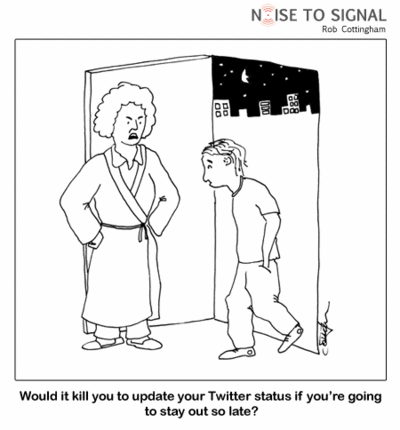von Roland Hachmann | Nov. 12, 2007 | Ad News, Blog, Digital Culture, Digital Marketing, Marketing Trends, Online Advertising, Social Media Marketing
https://www.youtube.com/watch?v=WeYMoz0zdag
von Roland Hachmann | Nov. 9, 2007 | Blog, Digital Culture, Social Media Marketing
Yes, at some point twitter might become mainstream for some purposes. This could be one:

This and other great cartoons of this kind you can find at the SocialSignal Blog.
(via here)
von Roland Hachmann | Nov. 5, 2007 | Blog, Digital Culture, Digital Marketing, Marketing, Mobile Marketing, Online Advertising, Social Media Marketing
Clever, very clever indeed. Google announces the Open Hand Set Alliance and liberates the 33 participating mobile phone operators from the claws of proprietary systems. From the Google Blog:
Android is the first truly open and comprehensive platform for mobile devices. It includes an operating system, user-interface and applications — all of the software to run a mobile phone, but without the proprietary obstacles that have hindered mobile innovation. We have developed Android in cooperation with the Open Handset Alliance, which consists of more than 30 technology and mobile leaders including Motorola, Qualcomm, HTC and T-Mobile.
It appears to carry very similar objectives as OpenSocial which was announced only last week. Google seems to favour open standards, so that the web as a plattform and mobile phones as the future personal device for everything will stay open and free. This should enable innovation to the benefit of the user, no doubt about that! But it might also serve Google quite well.
Why? I can only guess: Googles revenue models are still mostly built on advertising. So Google needs scalability in customer reach, which they can only keep increasing with ready access to information and users. As social networks are obviously becoming the dominating platforms for users to interact with, and mobile devices probably being the first choice for going „online“, then Google needs to be able to freely play on these grounds.
In the future, I think the key to revenue will most likely not reside in just delivering content, i.e. producing or transporting it, since there will be soooo much of it. And it is very labour intensive to produce it. Instead, it is much more efficient to
- intelligently aggregate and sort content (which Google already does)
- adequately aligning this content to the needs, preferences – and most importantly: intentions of the users.
Regarding the second point, I think it is fairly obvious that Google should be way ahead of the competition in gathering the necessary user data. Think about Google Toolbar, Google Analytics and Google AdSense, nevermind the main site, the search engine itself. They should have better tracking data than anybody else, which they can put to work for solving the second point above.
One thing that can stop the (nearly) endless scaling of Google’s model into the long tail of every single social media profile and mobile device is „artificial“ restrictions such as walled gardens and operating systems. So: very clever to launch initiatives to at least partially open up social networks and mobile phone operating systems.
von Roland Hachmann | Nov. 4, 2007 | Ad News, Blog, Digital Culture, Digital Marketing, Marketing, Mobile Marketing, Online Advertising, Social Media Marketing
von Roland Hachmann | Nov. 4, 2007 | Ad News, Blog, Digital Marketing, Marketing, Online Advertising, Social Media Marketing
There is Information about Facebooks new ad plattform. Especially interesting: the „beacon project“. If you purchase anything on third party sites (e.g. Amazon), it could be listed on your newsfeed. Of course you’re asked in advance, whether you want this data transferred across to Facebook. Nevertheless, I wonder how this will be taken up by users. Particularly in Germany, where users are rather careful with their data privacy, I think this feature will not be successful. Techcrunch has some more information on this.
Users will have several options to choose from:
… opt in to always including this data in their news feed, opt out to never include it, or opt in to include it with a secondary confirmation via the toast above. Users can also opt in/out for specific third parties.
That sounds OK, however I would never choose the first option, the danger of forgetting about it is too big. Not that I buy stuff on the web, but still it’s none of other people’s business..
On Tuesday, Facebook will announce the new ad systems, so that will be worth checking out.


 Wo ich sonst so bin...
Wo ich sonst so bin...